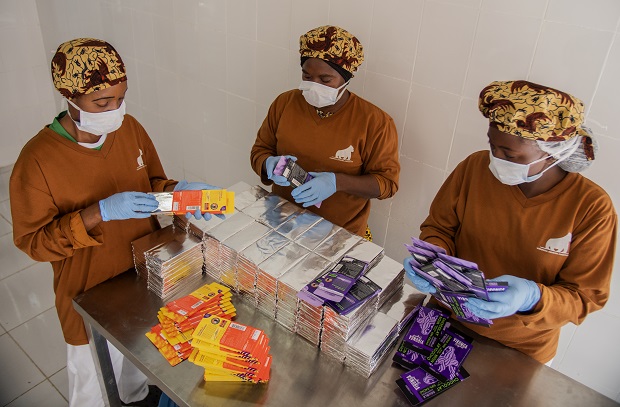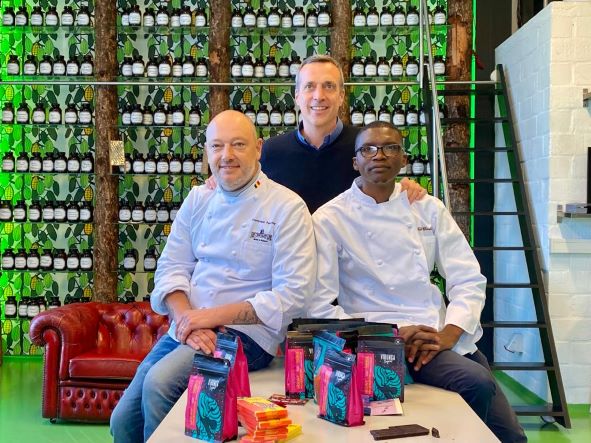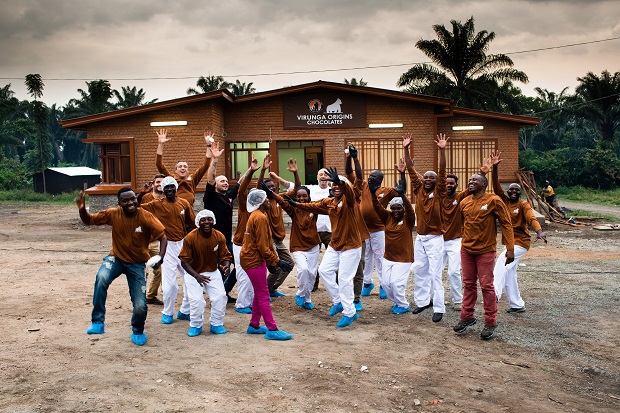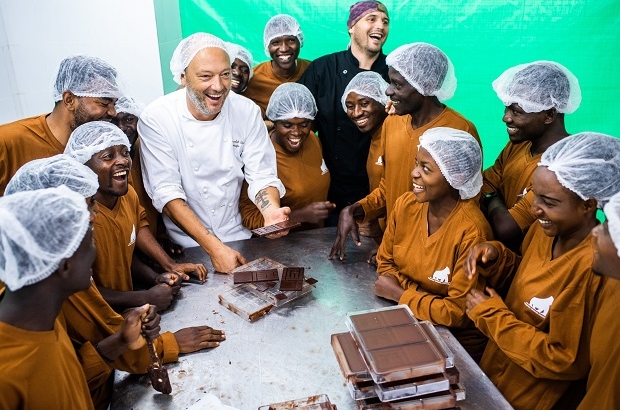- Daily & Weekly newsletters
- Buy & download The Bulletin
- Comment on our articles
How a Belgian chocolatier is throwing a lifeline to the conflict-rife Virunga region in the Congo
Home to a quarter of the world’s mountain gorillas, the troubled yet beautiful Virunga National Park in Africa, hasn’t always been associated with producing delicious chocolate.
But thanks to an anthropological project headed by sublime Belgian artisan chocolatier, Dominique Persoone, the confectionary from this region is now filling sweet smelling shop shelves.
Locals in and around Virunga have been given a helping hand to farm and produce chocolate in this area of outstanding natural beauty that lies in the Democratic Republic of Congo (DRC). Made from the rich harvest of cocoa beans found in this eastern Congolese basin, chocolate is proving a lifeline to communities in the tropical paradise known as the park of fire and ice.
The collaborative initiative is headed by Bruges-based Persoone, and is providing the region – Africa’s oldest park – with an economic back bone. Chocolate making has created jobs, homes, work skills and a new social mobility.
“I wanted to give something back to the people and do something positive as a thank you for the good fortune I have enjoyed in my life,” says Personne, the 2023 Gault & Millau chocolatier of the year.
Previously blighted by violent crime, poaching, the deadly spread of Ebola virus and social conflict, Virunga was crying out for solutions to its many problems. Most of the local population was unaware until recently that the park was rich in cocoa beans, and few had ever tasted chocolate.

Despite the region’s acute socio-economic problems, it was designated a world heritage site due to its breath-taking landscape and the natural habitat it provides for a vast range of flora and fauna. Preserving the future of the park, which houses endangered species such as mountain gorillas, was vital.
Following regular trips to the area, Persoone pursued his vision to improve the quality of life for the region’s people. The Virunga Origins brand is now going from strength to strength and the project has funded a hydro-electricity plant to power the factory and the surrounding area. It’s endorsed by the King Baudouin Foundation, which fosters sustainability and positive change in Africa and around the world.
The project also has the backing of global impact enterprise The World We Want Foundation, Mathieu Brees, founder of Belgium’s Bean-to-Bar company, and Dimitri Moreels, founder and co-chief executive of Envirium Life Sciences, a sustainable green project that’s also based in Belgium.
Persoone is the owner of world famous Belgian brand The Chocolate Line, which boasts outlets in Bruges and Antwerp. Not only does he buy the cocoa beans to produce his own high quality chocolate, he gives up his time and money to fund and sustain the chocolate-making operation in Virunga.
After 30 years in the business, he shares his knowledge and highly-tuned skills to help willing job-seekers in Virunga secure a brighter future. Persoone performs a teaching role on home soil in Bruges as well as at the DRC’s Mutwanga factory.

He recently invited Roger Muhindo Mararo, a 33-year-old chemistry and agricultural student to Bruges so that he could pass on the art of chocolate making to Congolese colleagues at home. The student grew up peering out from his bedroom window at the backdrop of cocoa trees and initially taught himself the basics by watching online tutorials (pictured above right with Dominique Persoone (left) and Dimitri Moreels).
While working as a hygienist during the height of the Ebola epidemic in 2016, he heard about the opening of the Mutwanga factory and knocked on its door to declare his devotion to the cause. Muhindo Mararo is now a Congolese master chocolatier due to his natural flair and acquired skills under the tutelage of Persoone, who’s a former pupil of world-renowned British chef, Heston Blumenthal.
Persoone has been altruistic in his endeavour to improve life for the locals. He bought the factory equipment with his own cash and is proud to admit he has not earned a penny from the project. The profits from the Virunga brand fund the running of the business and pay the wages of the local workforce. The chocolate bars are also on sale in his own stores in Belgium.
Transporting heavy machinery to the region proves logistically challenging due to the geography of the park and the high delivery costs. But the ever growing circular economy and Persoone’s own ‘can do’ ethos helps lower prices. “I bought a former curry grinder from India which achieved the same result for the cocoa beans,” he says, ever mindful of sustainability.

Persoone also works closely with Prince Emmanuel de Merode, a conservationist and anthropologist who has been director of Virunga National park since 2008. Both admit that the battle to eradicate poverty and rid the area of crime is a highly complex conundrum that cannot be solved overnight by sustainable businesses such as the chocolate factory.
“People poach and thieve because they have to feed themselves and their children so it is no good just going in and telling them to stop this or punish them. I believe that if we try to teach them there is another way of life then slowly things might change,” says Persoone.
Sharing this sentiment is Dimitri Moreels of Envirium Life Sciences: “We can change things by paying proper wages to the farmers and the factory workers, and we also have to protect the biodiversity in Virunga. We cannot lose the farmers, without them, the whole project would not exist.”
Persoone is philosophical in his personal outlook for the future of the project: “If we can bring peace and employment to this beautiful region and sprinkle a bit of hope, then it is good. I call it double happiness, bringing a better life for the people of Virunga, and they get to eat chocolate!”
Photos: The Chocolate Line; Persoone, Moreels and Muhindo Marar (c) Envirium Life Sciences



















